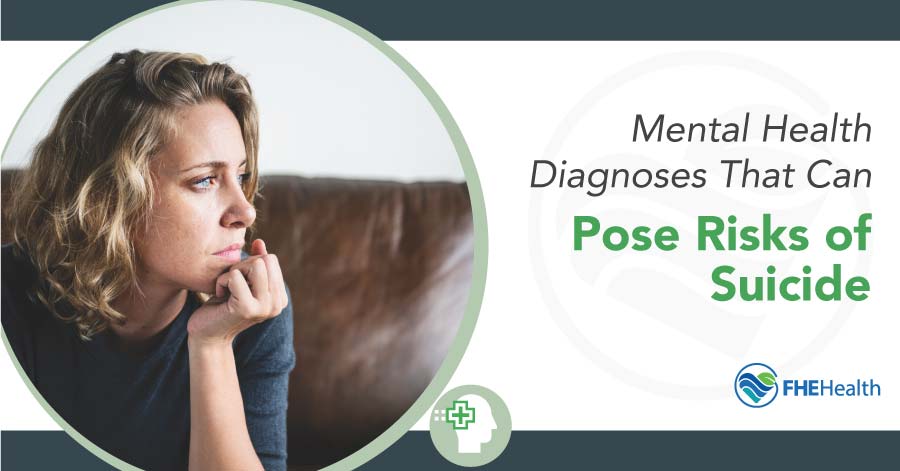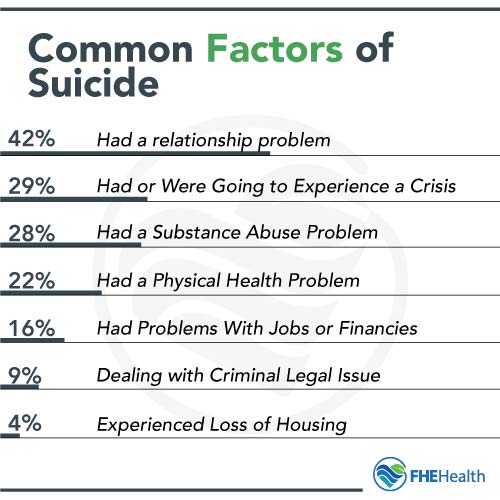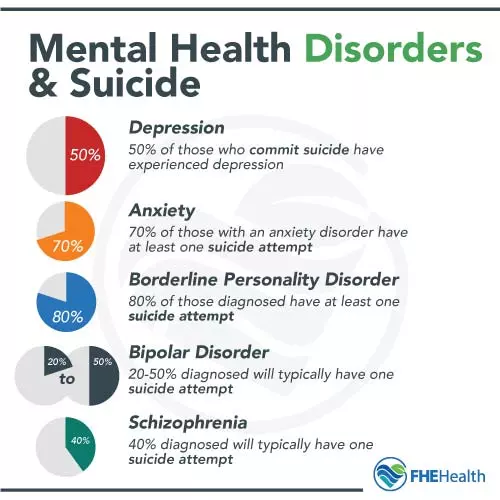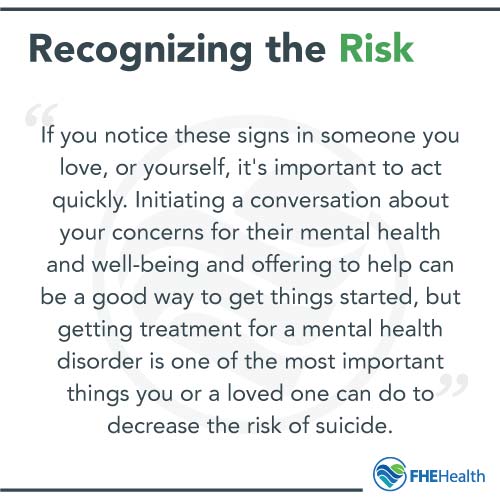
The American Foundation for Suicide Prevention reports that 129 people commit suicide every day on average, and suicide is the 10th leading cause of death in the United States. While suicidal thoughts can come from a variety of situations and factors, one risk is a mental health diagnosis. Here’s an overview of some of the mental health disorders that cause suicidal thoughts and what to be aware of.
Suicide and Mental Health
 People commit — or attempt — suicide for a variety of reasons that are often very individual. However, there are some trends and common risk factors for suicide that can help identify people who may be in danger.
People commit — or attempt — suicide for a variety of reasons that are often very individual. However, there are some trends and common risk factors for suicide that can help identify people who may be in danger.
- 42% had a relationship problem
- 29% experienced or were going to experience a crisis in the preceding or following two weeks
- 28% had a substance abuse problem
- 22% had a physical health problem
- 16% had problems with their jobs or finances
- 9% were dealing with a criminal legal problem
- 4% had experienced a loss of housing
Middle-aged white males have the highest suicide rates, and the most at-risk age group across that gender was 45 to 54 year olds. Where you live can also play a role, with Montana, Alaska and Wyoming having the highest suicide rates. However, one of the most important factors is mental health.
Although the Centers for Disease Control and Prevention reports that 54% of people who died by suicide did not have diagnosed mental health issues, according to Suicide Awareness Voices of Education, it’s estimated that approximately 90% of people who commit suicide have some kind of mental health disorder or a substance abuse problem. The difficulty is that without proper mental health care, someone experiencing suicidal thoughts may not even be aware that they have a mental health condition that is playing a role.
The Mental Disorders That Cause Suicidal Thoughts

Depression
Those who suffer from major depression experience ongoing feelings of hopelessness, worthlessness, sadness and even despair. It’s a debilitating condition that affects everything from personal relationships and physical health to a person’s job and finances. Depression is the mental health disorder most linked to suicide, with 50% of those who have committed suicide experiencing depression.
Anxiety
Anxiety is a blanket term that covers several mental health disorders, including obsessive compulsive disorder, panic disorder, post-traumatic stress disorder and generalized anxiety disorder. One study found that 70% of people who had a “lifetime history of suicide attempt” had some type of anxiety disorder.
Borderline Personality Disorder
Characterized by difficulty regulating emotion, erratic behaviors and self-harm, borderline personality disorder is thought to affect up to 6% of the population. It’s also much more common in women than men. Another study analyzed previous research on borderline personality disorder and found that around 80% of those diagnosed had attempted suicide. This disorder also has one of the higher suicide death rates, coming in at 8-10%.
Bipolar Disorder
Bipolar disorder is marked by periods of extreme highs and lows. Patients with bipolar disorder have difficulty regulating their emotions, which puts them at a higher risk factor for self-harm and suicide. It’s reported that somewhere between 20% and 50% of those diagnosed with bipolar disorder will attempt suicide.
Schizophrenia
Schizophrenia isn’t as common as some of the other mental health illnesses on this list, but it’s one of the most severe. It’s reported that around 40% of people diagnosed with schizophrenia will attempt suicide at least once. Those who are male, white, under age 30 and have a high IQ may be at even higher risk, particularly if they were able to live a fairly normal life prior to their diagnosis and are struggling with adjusting to living with their lifestyle now.
Substance Abuse
A history of substance abuse can greatly increase a person’s suicide risk, with one study finding that a history of abusing alcohol increases the chances of a person committing suicide by a factor of 10. Those who inject drugs are 14 times more likely to commit suicide.
Substance abuse plays a role in suicide because addicts often feel like there is no hope for change or have feelings of guilt and shame over their addictions and what it’s done to their lives and their relationships. But it also factors in because when you’re under the influence of a substance, your inhibitions are decreased, which makes it a shorter line between suicidal thoughts and suicidal actions.
Fighting Back

- Talking about suicide
- Feeling like there’s no hope or reason to live
- Feeling empty, trapped or like they are a burden to others
- Feelings of depression and anxiety
- Substance abuse
- Risk-taking behavior
- Erratic, unpredictable or often-changing moods
- Not engaging in previously enjoyed behaviors, habits and activities
- Withdrawing from friends and family
If you notice these signs in someone you love or yourself, it’s important to act quickly. Initiating a conversation about your concerns for their mental health and well-being and offering to help can be a good way to get things started, but getting treatment for a mental health disorder is one of the most important things you or a loved one can do to decrease the risk of suicide. Once an accurate diagnosis has been made (which can take some time, as there may be more than one issue going on), a treatment plan can be developed to help get you back on the road to mental health and a better life.






